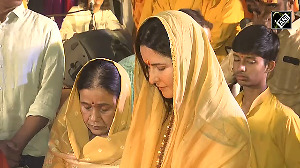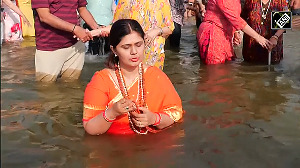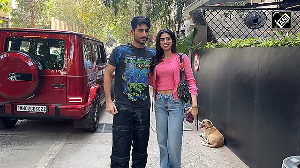He's one of India's uber savvy, young and charismatic politicians. With the right pedigree -- both by birth and by virtue of marriage -- and with impressive credentials, Sachin Pilot is certainly a man to watch out for. The son of late Rajesh Pilot, one of the Congress' more popular leaders, Sachin stays in the news for all the right professional and rarely personal reasons. What did make headlines was his wedding to Sara, J&K leader Farooq Abdullah's daughter, which did not initially find favour with her family. .
The picture-pretty, media-shy couple are the next guests on Rendezvous with Simi Garewal, where they speak with Simi about politics, life and then some.
This is a transcript from the first part of the show, which features only Sachin and will be telecast at 9.30 pm on May 28 on Star World.
Simi: Tell me politics wasn't the first choice for a career for you. Was it?
Sachin: I can't say it was. It wasn't something that I had thought of. Not at the stage of my life. I was still studying when my father passed away. And we never really talked about me becoming a politician because he was still young, he was doing well for himself and we were all behind him and he met with the accident and suddenly things changed.
Simi: You went to do your MBA at Wharton business school. So, would you say your course changed with your father's accident?
Sachin: In hindsight yes it did, like I said me becoming a politician or running for elections was never discussed, I and he never sat down and talked about this was ever going to happen.
Simi: Then, what made you join politics?
Sachin: I came back in 2001 and my mother had fought the elections after my father had passed away. She was an MP at that point. I was helping her in her work and was getting more and more active and slowly I started feeling that people wanted me to do a lot more than just giving a helping hand. And I worked within the party itself for a year.
Simi: Your father was known as a kisan neta and now you are known as the kisan neta. How does a Wharton grad identify with an Indian farmer?
Sachin: I as an individual I just do what I feel I ought to do. People of our country live in villages. And that's where India lives. But we must make those areas prosperous. And that's what I do in my life
Simi: Can you identify with the farmer?
Sachin: Absolutely. If you don't identify, if they cant relate with you, if they don't think of you in their good times and bad then
Simi: You can understand their minds and needs coming from Wharton as you do?
Sachin: Going to the US and doing an MBA from Wharton was something that I wanted to learn, I wanted to learn the best practices in business. And bring them back here and serve in India whatever form I could. But my family, at least my father when we were growing up, were never made to forget from where we came from, what are roots are, where we belong. My father has seen a very tough time when he was very young. So, we were always brought up keeping that reality in check. Everything comes and goes in life, fame, fortune, position, money, power, but if you have a conscience, and if you understand who you are, what your identity is, if you are centered, I think even your path is much more clearer.
Simi: What from Wharton do you bring to use in your present political career?
Sachin: Well, the Indian electoral politics has its own nuances. I don't think management techniques apply directly in that area. But I think as the world changes as India is changing a lot of issues now are related to economics.
Simi: Certainly and you are an economist
Sachin: Well I think it is important for people to understand how it is becoming more globalised, how the economy plays a lot more role than it did 10, 30 years ago. So, I think it's good that younger people not just in politics, in business in any area of work understands the world as one entity and I think higher education helps you to do that.
Simi: You know, in the 2004 elections, when you and other young educated, bright young boys stood for elections, there was great enthusiasm, we were all very happy. But have would you say your party has utilised the assets that you bring to the table.
Sachin: I think in the Congress party there is a lot of engagement with the members of the party, and we give our suggestions, we debate, we discuss, we deliberate, we approach our party leaders, our party president, our prime minister, our ministers and set that this is the set of issues that we think are important, we need to address them, these are the areas we need to prioritise, these are the areas we have been neglecting thus far, so I think when the party manifestos are made, when the budgets are made, a lot of engagement is done.
Simi: Tell me something truly.. isn't there a sense of frustration amongst you and your.. you know.. Milind Deora and Ajay and Scindia?
Sachin: I don't think so
I can speak for myself.. I think everyone of us has a certain mandate to do certain things
Simi: What is your mandate?
Sachin: My mandate is to serve the people in my constituency.. to further the ideology of my party
to help it become stronger than it is today..that's my personal mission.
Simi: Now when you go back to seek a mandate in the next elections, what are you going to tell them, that you have done for them?
Sachin: You know, the Indian electorate is very smart. It doesn't matter what I say on this show.. It doesn't matter what I say on public platforms and in my speeches. They know exactly who has done what. So the
list is long
Simi: Of what you have accomplished
Sachin: What I've done.. what I've got moving
things are on the ground for the people to see. But I think more than the results, people also see how much effort you have put into it. I think if you are genuinely making an effort to get things done, people appreciate that.
Simi: Sachin, we know that India is a flourishing economy and the world is looking at us with a great potential power, but there are problems. There are intrinsic problems in India, which need to be addressed. I want to know from you what worries you most?
Sachin: The single biggest worry that I have
India consists of 640,000 villages. I think if they are not made stakeholders in India's great growth story I think we're doing ourselves a disservice. If we can get them into the mainstream, I think that's the biggest thing we have to achieve.
Simi: Mainstreams meaning the cities right?
Sachin: No.. Mainstreams are people who have jobs, people who are looking to.. aspiring to have a better life.
Simi: When you were just an ordinary citizen and not a politician
what did you feel about all these things?
Sachin: I felt the same way. I felt we need to shape some dreams... do something different and need to get going and I feel now it has begun to happen. But now I realise that we can't do it overnight you know. It takes time in this country to build consensus and policies. We have a coalition government. We have a fragmented mandated parliament. We have to evolve a consensus. That takes time.
Simi: But I always feel that politicians
everybody
you are a normal person before you become a politician. There are two categories- normal person and politician.
Sachin: I think that's not fair!
Simi: Then once you become a politician you start defending what's wrong with the system by justifying it.
Sachin: I think
when you become a politician one learns to be less critical. One must accept and acknowledge realities but that doesn't mean that you must criticise everything you do.
Simi: Another very important point -- what about corruption in politics? Why is the politician immune to the law and accountability?
Sachin: There is no law in the country that says that politicians are immune. Everyone is equal in the eyes of law. Corruption is something that is most closely associated with politics. I agree with you on that. I think it is the job of the politicians or the political class to lead by example. I think we have not been able to do that.
Simi: One-fifth of the members of the parliament have been accused of crime, embezzlement, rape and murder and nothing has been done about it. They move around freely. They're immune to the law. Where as, if the common man did this
all the force would stand on him. He wouldn't stand a chance.
Sachin: No one's proud of that. Nobody's proud of that.
Simi: True! What kind of an India do you see 10 years from now? 2016?
Sachin: I see a much, much stronger India. I see a country that is young, progressive, a country that actually has transcended its differences. I just hope the younger people taking on a larger role in society
we're able to overcome those religious, cultural, linguistic, regional barriers that we have. I think that will happen if we grow as one single entity.






 © 2025
© 2025